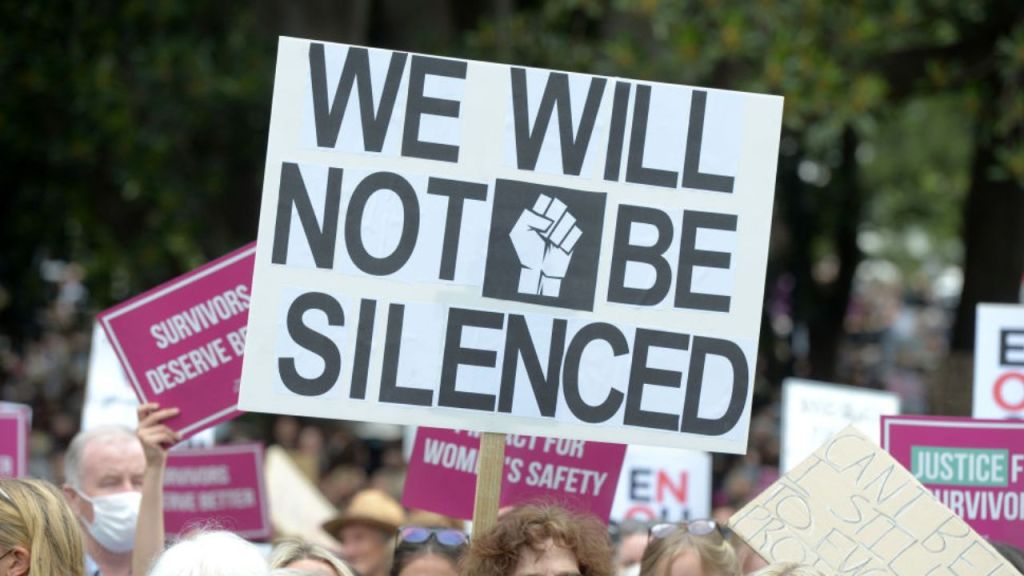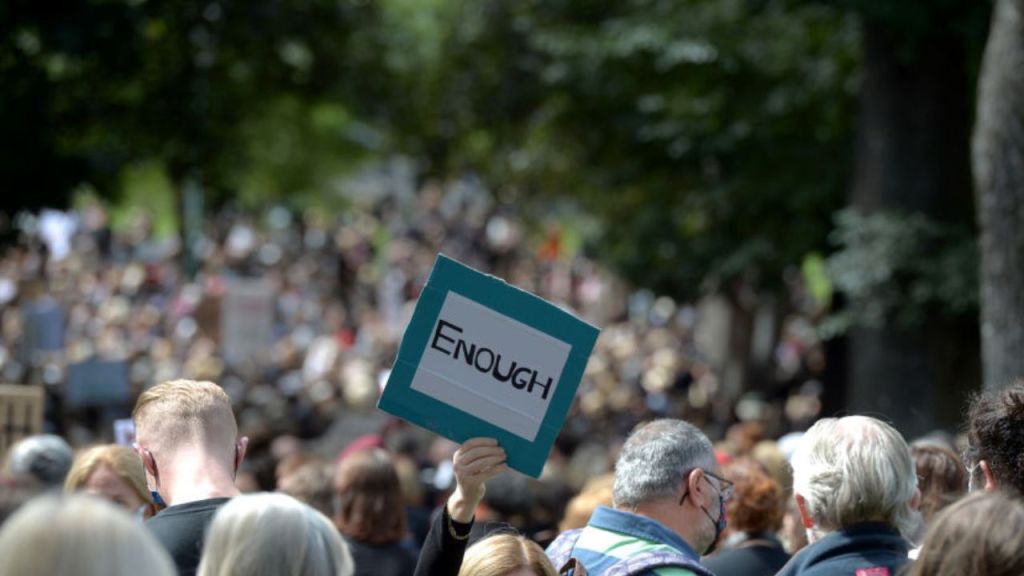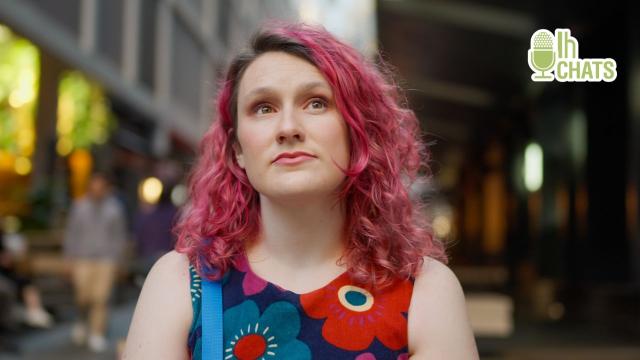Content warning: this article discusses topics of consent, sexual assault and sexual violence. Please reach out to 1800RESPECT if you ever need any help.
Saxon Mullins has long been a formidable force pushing Australia to reform its consent and sexual assault laws. She’s also part of the larger movement over the past few years that has pushed consent conversations into the mainstream for the country. Despite there still being to be a long way to go, Mullins remains hopeful that we as a nation can build strong foundations to better support survivors.
Appearing in the three-part docuseries about consent called Asking For It, Mullins is interviewed by investigative journalist Jess Hill, who sets out to explore the topic of consent in Australia and the critical need for greater consent education.
The series features three episodes where Hill talks to advocates and the experts who are leading the charge in implementing comprehensive consent education across Australia. Asking For It also sees Hill meet with prominent victim-survivors who have spearheaded this consent revolution, like Mullins.
To chat about the series, the need for better survivor support and how we can better empower sexual assault survivors, Lifehacker Australia had the privilege of speaking with Saxon Mullins, Director of Advocacy at Rape and Sexual Assault Research and Advocacy (RASARA).
Mullins was also the recipient of the Australian Human Rights Commission’s 2018 Young Persons’ Human Rights Medal, so it was a true honour being able to talk about this important topic with her.
Why do we ignore the topic of consent?

One of the very first things Hill asks in the first episode of Asking For It is why we, as a society and individuals, ignore consent and don’t believe sexual assault survivors when they come forward.
It’s been a question that I’ve been thinking about ever since I watched the episode and one that I posed to Mullins.
“I think a lot of the time it’s because sex is so taboo, right? Still, even now, people are more comfortable talking about it than ever, but it’s still taboo,” Mullins explains.
“The way that we view consent is a hurdle to a thing we get to do, rather than an experience or conversation that’s ongoing.”
“I think for perpetrators, they are just looking for the tiniest thing of a ‘yes’ or an absence of a ‘no’ and that to them is enough, that to them has cleared them of any wrongdoing and they get to do whatever they get to do,” Mullins continued.
If you think about who commits acts of sexual violence, chances are they aren’t going to be people you know or hold close to you. Rather, in our minds, they are strangers who lurk around at night.
Mullins believes that this idea of sexual violence, often given to us by the media, is part of the problem.
“Part of our desire to disbelieve survivors is partially because we have this idea of what sexual violence looks like, which is a stranger in a scary dark place and they jump out in the middle of the night. That is our idea of sexual violence. We know that’s not true, and we know that most perpetrators are known to their victims,” Mullins explains.
“But thinking about it in that way would mean we have to think about our own actions and we have to think about the actions of our friends and people don’t want to do that.”
“It’s easier to create monsters. It’s easier to ‘other’ perpetrators rather than to say we live with them.”
This principle applies largely to men who often don’t want to look inward and potentially see situations where they may not have been given explicit consent.
“I think, particularly for men, they don’t want to see anything in their own behaviour that was problematic. They don’t want to think ‘Oh, that’s assault, so then maybe something I have done has not been good’. It’s a scary thought.”
The safety net for survivors is full of holes
A common argument that is brought up to survivors is why they didn’t report it to the police.
In Australia, as of 2021, there was a rise of 13 per cent in sexual assault reporting to the police. However, it’s believed that 87 per cent of people who experience sexual assault don’t ever report the crime.
Around 1.5 per cent of sexual assault cases result in a conviction, which leaves a very large amount of survivors having to go through re-traumatisation, only to be disappointed with the outcome.
The way our current framework is structured, according to Hill in a previous interview I had with her, is not built to support survivors.
“The safety net, as was the case with family violence, is full of holes and it cannot be built enough to catch everyone. That’s a massive flaw in our system,” Hill said.
So, what needs to be done?
Something that many activists like Mullins and Hill call for is a specialisation within the police force so that they can better deal with sexual assault survivors that may come to report a crime.
As Hill explained, “You cannot have a general duties police officer reliably interacting with a sexual assault survivor when they’re giving their testimony. It’s just too much of a front desk lottery.”
For Mullins, having a specialised response in every aspect will help alleviate some of the trauma that comes with reporting sexual assault.
“We need police who have the training, … we need specialised courts, people who are trained, who are trauma-informed and really trauma-informed not just the buzzword aspect of it,” Mullins elaborated.
“[We need to make] sure that while engaging with the legal system, we’re not returning to re-traumatising survivors just for the sake of it. We’re not asking them to do things just because it makes the prosecutor’s life easier. We need to be making sure that survivors are looked after.”
It’s also important that we are creating other avenues for survivors to go and get support from; not just leaving them to rely on the legal system.
“Most people will not report to the police. Even those that do, most will not see a courtroom. So we need to be creating other avenues and other ways to access the core services without having to go to the police and access other things without having to go through the brutal criminal justice system.”
We need to see survivors as humans first
We often speak about needing to empower survivors to speak up, but for Mullins, it’s important that we first recognise many of them as humans first.
“I think to empower survivors to speak up, there are a lot of aspects of our society that we need to work on as well. A majority of survivors of sexual violence are trans, majority of survivors of sexual violence are First Nations, they’re women of colour, they’re non binary people,” Mullins explained.
“We need to create a safe space for them to come forward as a person first and then bring their own experiences of sexual violence as well. It’s well and good to say that we have started listening and I think it’s absolutely true, but who are we listening to and who are we not hearing from and who is not being given that voice?”
“I think that’s one of the most important next steps that is hopefully already happening, making sure that survivors of all races of all genders feel comfortable being themselves and telling their stories and I think that is the biggest aspect because we have community groups, we have places like The Survivor Hub where survivors can get together and have this shared experience and find that community, but we need to make sure that community is safe for survivors.”
These steps are slowly being made, with shows like Asking For It involving people from diverse life experiences in the conversation around consent.
For many people, like Mullins, this shift in conversations and who has the power to drive narratives around consent is signalling a hopeful way forward.
The path towards consent laws is hopeful

The work that Mullins does at RASARA, which is to ultimately lower rates of sexual violence, is the reason why many Aussies can feel as though we are moving forward in a positive way.
“The shift that I’ve seen the most is the sustained conversations that we’re having around [sexual assault and consent] … it does seem to have stayed in the news cycle. The news is not necessarily always kind or understanding or written from the right perspective, but it has been something that people are consistently talking about,” Mullins said.
“The other thing, which I think is a really massive difference is that politicians have to care about this now. Of course, there are those who still don’t … but there are politicians who do have to care about this and they will have questions about it, and they can’t just ignore it. These are big things that we need election promises about. These are big things that people are asking, ‘What are you going to do about it?’ I think that’s massive.”
When I asked Mullins herself if she thought that there was some hope in the future of consent laws in the country, she hesitantly agreed.
“I do think there is a bit of an appetite to have those conversations at a state and a federal level. I think there is also an appetite to do the bare minimum, which is potentially the slogan for all politics ever. It is an easy thing to do with something like consent laws, you can just look over another state shoulder and copy what they did and not try and make it better at all,” Mullins said.
“Hopefully at some point, we will see politicians and lawmakers taking proactive steps to make life better for survivors, rather than having to be dragged kicking and screaming by survivors. That would be ideal and I think there is a possibility that we could get there if people keep caring as much as they do [now].”
Asking For It is a three-part series that premiered on Thursday, April 20 at 8:30 pm on SBS and SBS On Demand. The final episode airs Thursday, May 4, after which you can still watch the series on SBS On Demand.
If this article has raised any concerns for you or someone you know, please call 1800RESPECT on 1800 737 732 or visit the 1800RESPECT website. You can also call Lifeline on 13 11 14. In case of emergencies, call 000.

Leave a Reply
You must be logged in to post a comment.